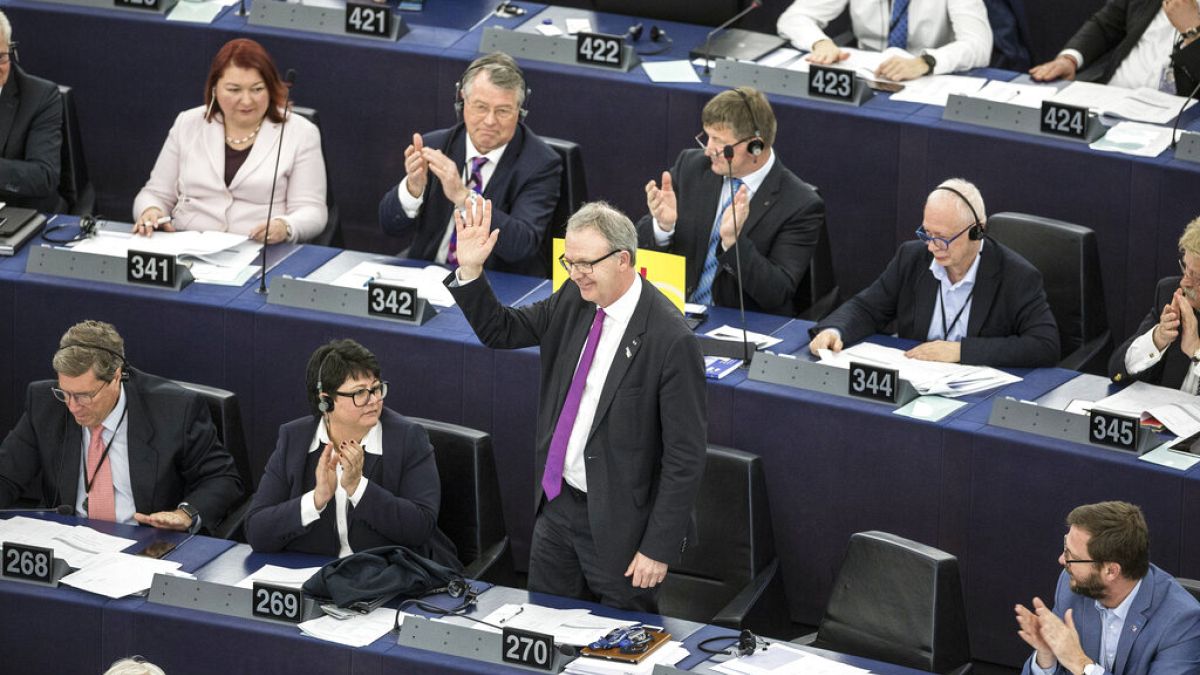Most key tech lawmakers are returning, but there are some surprising new arrivals.
Europe woke this week to a rightward-shifted European Parliament, although the so-called ‘grand coalition’ between the centre-right European People’s Party (EPP), the centre-left Socialists and Democrats (S&D) and the liberal Renew Europe group still stands, with just over 400 lawmakers between them.
Most of the rapporteurs – the lawmakers in charge of steering a file through Parliament – on key technology dossiers in the last mandate emerged from the EPP, S&D and Renew groups. But Renew, as well as the Greens, lost significantly in the EU elections. Some marginal parties which previously impacted on privacy and data protection issues, such as the German and Czech Pirate Party – part of the Greens/European Free Alliance (EFA) group – have also lost ground.
We assess what this new Parliament composition means for tech policy.
Right is strengthened, but disunified
Even if the grand coalition remains unchanged, the shift towards the right could affect EU digital policy and the implementation of past legislation. The centre-right EPP, the hard-right European Conservatives and Reformists (ECR), and the far-right Identity and Democracy(ID) both broadly favour policies designed to boost investment over attempts at regulation. However, their approaches vary significantly.
According to Alexandre de Streel, Academic Director of the digital research program at think tank CERRE, the EPP, ECR, and ID groups all agree on the need to have the right legal framework in place for implementing tech laws, while also protecting small businesses.
But while ECR and ID advocate for a strong European industrial policy that supports national champions, the EPP is in favour of “innovation from wherever it comes, preferably from Europe but also from anywhere else,” De Streel said.
Privacy matters
As an example: the Parliament and EU member states are currently still trying to find an agreement on rules to combat child sexual abuse material online (CSAM).
The EPP has signalled it is willing to go so far as to halt to end-to-end encryption on CSAM. “We need permanent and binding EU rules to prevent and combat child sexual abuse. We want to use all necessary instruments to protect children and to further strengthen the EU’s actions on the Rights of Children,” according to the party’s manifesto.
By contrast, the ECR opposes any “proposals to de-anonymise the internet and to require user identification”, its own manifesto stated. Instead, it called for “a safe internet based on parental empowerment, not government control.”
And when it comes to the far-right, the ID group opposes any form of digital regulation decided at EU level. One of the group’s key issues is the fight against online censorship, as it claims to champion freedom of speech.
However, as De Streel told Euronews, the hard-right and far-right are also divided within their political groups. “They are divided on many issues, tech included, but also on others. In fact, there are few things that unite them, except opposition to Europe and opposition to immigrants,” he said.
Which key MEPs/rapporteurs are returning?
Considering incoming lawmakers, the majority of candidates previously listed by Euronews as tech players will return to Brussels, with the caveat that not all countries have confirmed their lists yet.
These include Kim van Sparrentak (Netherlands/Greens), Svenja Hahn (Germany/Renew), Brando Benifei (Italy/S&D) and Alex Agius Saliba (Malta/S&D), who were all very active during the negotiations on the AI Act.
Also making their voices heard in the chamber once again will be Christel Schaldemose (Denmark/S&D) – who was big on the Digital Services Act, as well as German Greens Alexandra Geese and Sergey Lagodinsky. For the ongoing negotiations on CSAM, rapporteurs Javier Zarzalejos (Spain/EPP) and Birgit Sippel (Germany/S&D) will also return.
Heading for a record-busting stint in Parliament is Axel Voss (Germany/EPP), who previouslysteered through files such as the General Data Protection Regulation (GDPR) and the Copyright reform. Voss, an MEP since 2009, negotiated on the AI Act and AI liability during the 2019-2024 mandate.
Meta in the Parliament
Among the newcomers are two former Meta employees. Aura Salla (Finland/EPP) is no stranger to Brussels. She previously ran unsuccessfully in the 2014 and 2019 EU elections and was an advisor to Finnish EU Commissioner Jyrki Katainen.
Salla moved to US big tech company Meta in 2020 where she became Public Policy Director and head of EU affairs, before getting elected to the Finnish national parliament in early 2023.
For Hungary, Dóra Dávid, currently Associate General Counsel at Meta in London, got elected. Dávid previously worked at eBay in the UK. She joined the Tisza opposition party of Péter Magyar, which scored 29.7%. It remains unclear if she will actually take up her seat.
Possible commissioners
Two tech-associated MEPs touted for possible Commissioner roles are Eva Maydell (Bulgaria/EPP) and Marcel Kolaja (Czechia/Greens-EFA).
Maydell, one of the best-known lawmakers on tech files such as the Chips Act, AI and data rules, has been making waves since she entered Parliament in 2014. Kolaja, a former software engineer and digital rights activist, is among three candidates from his native Czechia for the top role.
Those not returning
Sophie in ‘t Veld, a Dutch MEP who ran on behalf of Volt Belgium to keep her mandate, did not get elected. The veteran MEP who was first elected in 2004 on behalf of Dutch D66 (part of Renew), managed to make a name for herself with a very critical stance towards the European Commission on data protection and privacy issues.
We will also not see more of Dragoș Tudorache (Romania/Renew): he was not on his party’s list. He had been expected to bag a role in the Commission’s AI Office. The Office is still looking for senior advisors.

